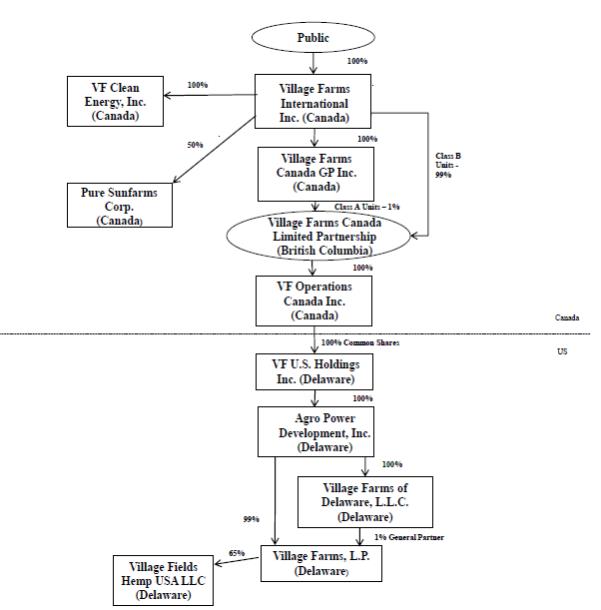The Company cannot predict the time required to secure all appropriate regulatory approvals for the Joint Venture’s products, or the extent of testing and documentation that may be required by governmental authorities. Any delays in obtaining, or failure to obtain the necessary regulatory approvals will significantly delay the development of the Joint Venture’s markets and products and could have a material adverse effect on the business, results of operations and financial condition of the Joint Venture and the Company.
Risks Associated with Changes in Laws, Regulations and Guidelines
The activities of the Joint Venture are subject to various laws, regulations and guidelines by governmental authorities, particularly under the Cannabis Act, relating to the manufacture, management, packaging/labelling, advertising, sale, transportation, storage and disposal of cannabis, but also including laws and regulations relating to drugs, controlled substances, health and safety, the conduct of operations and the protection of the environment, among other areas. Changes to any such laws, regulations and guidelines due to matters beyond the control of the Company may adversely impact the business, financial condition and results of operations of the Joint Venture and the Company. The Company endeavours to comply with all relevant laws, regulations and guidelines. To the best of the Company’s knowledge, the Company and the Joint Venture is in material compliance with all such laws, regulations and guidelines.
On April 13, 2017, the Government of Canada released BillC-45, which proposed the enactment of the Cannabis Act to regulate the production, distribution and sale of cannabis for recreational adult use. On November 27, 2017, the House of Commons passed BillC-45. On June 19, 2018, the Senate approved BillC-45 and the Act received Royal Assent on June 21, 2018. The Cannabis Act came into force on October 17, 2018. On December 22, 2018, the Canadian federal government published draft regulations for edible cannabis, cannabis extracts, and cannabis topicals.
In addition, the governments of every Canadian province and territory have, to varying degrees, established regulatory regimes for the distribution and sale of cannabis for adult use purposes within those jurisdictions. There is no guarantee that legislation respectingadult-use retail will remain unchanged or create the growth opportunities that the Company currently anticipates. As the laws continue to evolve, and the distribution models mature, there is no assurance that provincial and territorial legislation enacted for the purpose of regulating recreational cannabis will continue to allow, or be conducive to, the company’s business model. Differences in provincial and territorial regulatory frameworks could result in, among other things, increased compliance costs, and increased supply costs. Any of the foregoing could result in a material adverse effect on the Company’s business, financial condition and results of operation.
Additionally, although neither the Company nor the Joint Venture has any federally prohibited cannabis-related operations in the United States as certain members of the Company’s management team are located in the United States, the Company and the Joint Venture may be subject to risks with respect to changes in cannabis regulation and enforcement in the United States. Any changes in the United States regulatory regime, or the scope and extent of the enforcement thereof, could have a material adverse effect on the business, prospects, financial condition, results of operations and cash flows of the Joint Venture and the Company.
Regulatory Compliance Risks
Achievement of the Joint Venture’s business objectives are contingent, in part, upon compliance with regulatory requirements enacted by governmental authorities and obtaining all regulatory approvals, where necessary, for the sale of its products. Neither the Company nor the Joint Venture can predict the time required to secure all appropriate regulatory approvals for the Joint Venture or its products, or the extent of testing and documentation that may be required by governmental authorities. Any delays in obtaining, or failure to obtain, regulatory approvals would significantly delay the development of products and could have a material adverse effect on the business, prospects, financial condition, results of operations and cash flows of the Joint Venture and the Company.
As a federal License Holder under the Cannabis Act, the Joint Venture is operating in a relatively new industry and market. In addition to being subject to general business risks, the Company must continue to build brand awareness in this industry and market share through significant investments in its strategy, production capacity, quality assurance and compliance with regulations. In addition, there is no assurance that the industry and market will continue to exist and grow as currently estimated or anticipated or function and evolve in the manner consistent with management’s expectations and assumptions. Any event or circumstance that adversely affects the cannabis industry, such as the imposition of further restrictions on sales and marketing or further restrictions on sales in certain areas and markets could have a material adverse effect on the Company’s business financial conditions and results of operations.
- 36 -

